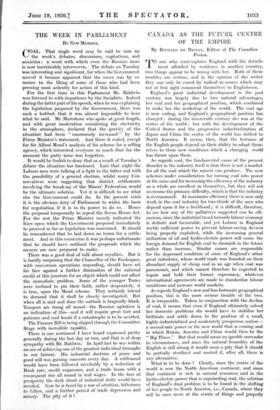THE WEEK IN PARLIAMENT
BY NEW MEMBER.
COAL. That single word may be said to sum up the week's debates, discussions, cogitations, and anxieties : a word with which even the Russian issue is now inextricably interwoven. The debate on Tuesday was interesting and significant, for when the Government moved it became apparent that the move was by no means to the liking of some of those who had been pressing most ardently for action of this kind.
For the first time in this Parliament Mr. Baldwin was listened to with impatience by the .Socialists, Indeed during the latter part of his speech, when he was explaining the legislation, proposed by the Government, there was such a hubbub. that it was almost impossible to hear what he said. Mr. Hartshorn who spoke at great length, and with great moderation considering the electricity in the atmosphere, declared that the gravity of the situation had been " enormously increased " by the Prime Minister's statement. And there it ended, except for Sir Alfred Alond's analysis of his .scheme for a selling agency, which interested everyone so much that for the moment the, party issue was forgotten.
It would be foolish to deny, that as a result of Tuesday's debate the situation has hardened. Late that night the Labour men were talking of a fight to the bitter end with the possibility of a general election, whilst many Con7 servatives were suggesting that district settlements involving the break-up of the Miners' Federation would be the ultimate solution. Yet it is difficult to see what else the Government could do. In the present crisis it is the obvious duty of Parliament to widen the basis for negotiation if it is in its power to do so. Hence the proposal temporarily to repeal the Seven Hours Act. For the rest the Prime Minister merely indicated the lines upon which the Government proposed immediately to proceed so far as legislation was concerned. It should be remembered that he laid down no terms for a settle- ment. And in this connexion it was perhaps unfortunate that he should have outlined the proposals which the owners are now prepared to make.
There was a good deal of talk about royalties. But it is hardly surprising that the Chancellor of the Exchequer, with conversion operations impending, should have set his face against a further diminution of the national credit at this juncture for an object which could not affect the immediate problem. Some of the younger Tories were inclined to pin their faith, rather desperately, it is true, upon the Mond scheme. They certainly intend to demand that it shall be closely investigated. But when all is said and done the outlook is tragically black. Tempers are rising all round—the Russian agitation is an indication of this—and it will require great tact and patience and cool heads if a catastrophe is to be averted.
The Finance Bill is being slipped through the Committee Stage with incredible rapidity.
There is one sentiment I have heard expressed pretty generally during the last day or two, and that is of deep sympathy with Mr. Baldwin. In April last he was within . an ace of achieving one of the greatest individual triumphs in our history. His industrial doctrine of peace and good will was gaining converts every day. A settlement • would have been followed inevitably by a reduction of Bank rate, credit expansion, and a trade boom with a consequent rise all round in real wages. In the face of prosperity the dark cloud of industrial strife would have . receded. Now he is faced by a war of attrition, bitterness to follow, and a further period of trade depression and misery. The pity of it 1










































 Previous page
Previous page